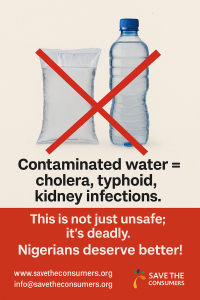
Water is life — but only when it is safe. Across Nigeria, sachet and bottled water have become the most common sources of drinking water for millions. Yet, reports of strange taste, foaming, and discoloration in some brands are raising serious concerns. Unsafe water is not just unpleasant; it is a silent threat to public health.
Causes of Unsafe Sachet and Bottled Water
Poor Filtration and Treatment
Many producers fail to properly filter or disinfect their water, leaving behind dangerous microbes and impurities.
Chemical Contamination
Some water sources are polluted with pesticides, industrial waste, or heavy metals. Overuse of chlorine or other chemicals during treatment can also give water an odd taste.
Microbial Growth
Bacteria, viruses, and fungi thrive in unhygienic production environments or poorly sealed sachets and bottles.
Plastic Leaching
When water is exposed to sunlight or stored in hot conditions, chemicals from plastic packaging (like BPA and phthalates) can seep into the water.
Expired or Substandard Packaging
Low-quality sachets or reused bottles easily contaminate water, putting consumers at risk.
Improper Storage and Transportation
Storing water near fuel, waste, or in dirty environments exposes it to harmful contaminants before it reaches consumers.
⚠️ Health Dangers of Contaminated Water
Cholera – severe watery diarrhea that can kill within hours if untreated.
Typhoid fever – prolonged fever, weakness, abdominal pain.
Kidney infections and stones – linked to high mineral or chemical contamination.
Diarrhea and dysentery – from bacteria like E. coli and Salmonella.
Hormonal and reproductive issues – caused by toxic chemicals leaching from plastics.
Long-term cancer risks – associated with prolonged chemical exposure.
What Consumers Must Do
Always check for NAFDAC registration numbers on sachet and bottled water.
Avoid buying water stored under the sun or near fuel stations.
Demand regular quality checks and accountability from producers.
Report suspicious brands to NAFDAC and consumer protection agencies.
Save The Consumers Call-to-Action
Nigerians deserve safe, clean drinking water. We call on NAFDAC, SON, and other regulatory bodies to strengthen monitoring, enforce stricter safety standards, and protect consumers from substandard water products.
Your health is your right — don’t compromise it. Together, we can ensure every drop of water is pure, safe, and life-giving.
